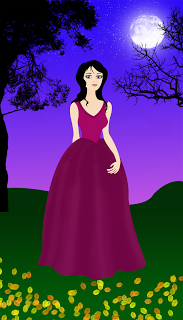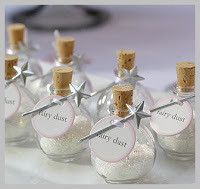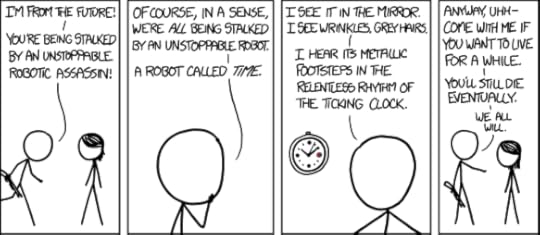Lexi Revellian's Blog, page 12
April 28, 2013
Sequels, like pregnancy, are best planned...
 The quickest way to succeed as an indie author is to write a series in a popular genre. Failing this, write consistently in one genre. (I speak as one who has failed to do either, and look wistfully at better-selling authors who have.)
The quickest way to succeed as an indie author is to write a series in a popular genre. Failing this, write consistently in one genre. (I speak as one who has failed to do either, and look wistfully at better-selling authors who have.)I am often asked if there will be a sequel to my novels. If readers relate to your characters, naturally they want more of them. The problem is, Remix, Replica and Ice Diaries were written as stand-alone stories, and it's hellishly difficult to write a sequel you haven't planned for. We all know JK Rowling took five years to finish the first Harry Potter, as in order to write it she needed to have a good idea of what would happen in the next six volumes. This took time to work out.
Plenty of authors, after publishing a popular book, are prevailed on by readers, agents, and publishers to write a follow-up they never intended. There's also the enticement that it's the easiest way to ensure an eager readership for your next novel. And it's almost always a mistake. Here's my incomplete and arbitrary list of disappointing because unplanned sequels to brilliant novels:
Catriona , sequel to Kidnapped by Robert Louis Stevenson. RLS remarked in the Dedication, It is the fate of sequels to disappoint those who have waited for them, and he was not wrong. I've read it long ago, and can remember almost nothing about it, whereas I can recall every detail of Kidnapped. Bridget Jones: The Edge of Reason , sequel to Bridget Jones by Helen Fielding, has some good bits in it, but suffers the usual problem of unplanned sequels. Having got hero and heroine satisfactorily together in Book 1, the author is obliged to split them up in Book 2 and get them together again, leaving the reader doubting this second happy ending would last. Also, to my mind, the balance of Bridget being clever and Bridget being stupid is wrong in the second book. She's too often stupid. The Starlight Barking , sequel to 101 Dalmatians by Dodie Smith, is...how can I put this...barking. It involves all humans falling asleep at once, dogs levitating, and a visit from an extra-terrestrial dog called Sirius to rescue Earth's dogs from the possibility of nuclear war. Weird. Predator's Gold , sequel to Mortal Engines by Philip Reeve. In the end, he wrote a quartet of books. Mortal Engines is a ground-breaking, absorbing and surprising read, but I'd have preferred the story to end there.Films are no different. I only like the first Back to the Future and Planet of the Apes. The exception is Terminator 2, which I think is even better than Terminator 1.
What do you think? Nominations?
Published on April 28, 2013 03:33
April 14, 2013
Could Big Publishing put up a website to compete with Amazon's?
Someone on KBoards started a thread about whether readers would flee to the Big Six (actually the Big Five now we have Random Penguin) for guidance as to what to read, faced with a flood of indie offerings of mixed merit. Perhaps they might band together and create their own website to rival Amazon, selling only quality books from approved writers? KB Burke's comment was so interesting I asked his permission to quote it here:
Just some observations from a software developer ...
The big publishers haven't figured out discoverability. Their talent pool means little when readers can't find the books. Just because they put 1,000 vetted writers on a site, doesn't mean I can find the 12 that I want to read.
To do that, they need years of buying behavior. The science behind 'also boughts' is called Collective Intelligence, and making the website is 10% of the battle. Basically, you model the mass behavior of people, and then identify patterns. 16 year old guys who bought Warhammer books, also bought Halo books. If you're 16, and have bought one of these things, you might like the other. And so on. It's statistics, but you need data to build the model.
This is why Amazon bought Goodreads, for the data. If the Big Six understood software engineering they would have bought that network years ago. Websites don't sell books. Data sells books, and the big publishers don't have the data to compete. They are 10 years late to the party.
This why Amazon is always tweaking their algorithms. They get more data and adjust their models. It's no different than a presidential campaign modeling an election by 'likely voters.'
Dozens of tech companies, with big time talent, like Apple and Google and Sony, have failed to compete with Amazon. They don't have data, but they do have some of the most talented engineers in the industry. Think about that. No one in New York will have anything like Google's resources, and Google isn't hurting Amazon at all.
As far as quality goes ...
There might be 100,000 bad indie titles, with quality issues, but it is probably a bell curve. Some percentage are high quality, 5-10%, that compete with the big publishers.
This has been true since the 1930s and the beginning of pulp. There is an ocean of crap, and a small handful of standouts. Who curates that crap doesn't matter. This is why word of mouth sells books. Amazon has made significant leaps in this regard, with their algorithms, but no one else is close.
The ocean is bigger today, but the model is the same as Edgar Rice Burrows. His books sold, despite that ocean of crap.
Collective Intelligence is really why Amazon dominates the book industry. The traditional publishers have a team of editors telling me they found another Edgar Rice Burrows. They are telling me what I should read. Meanwhile Amazon is telling me what people do read. People who like Burrows have also bought x, y and z. This helps me find my tribe, so to speak.
This is the now. The automation of white collar jobs, like book curation, and it won't ever go away. New York thinks good taste can't be automated, but that's because they don't understand the science.
Published on April 14, 2013 09:17
April 6, 2013
Agents' U-turn on self publishing
 I'm sure we all remember that expression 'tsunami of crap' with reference to self-published books. Not sure where it originated, but the expression was bandied about a lot two or three years ago. An article in the Wall Street Journal by Eric Felton in July 2011 titled
Cherish the Book Publishers - You'll Miss Them When They Are Gone
bemoaned the fact that anyone could publish an ebook, and worse, sell it to a gullible public.
I'm sure we all remember that expression 'tsunami of crap' with reference to self-published books. Not sure where it originated, but the expression was bandied about a lot two or three years ago. An article in the Wall Street Journal by Eric Felton in July 2011 titled
Cherish the Book Publishers - You'll Miss Them When They Are Gone
bemoaned the fact that anyone could publish an ebook, and worse, sell it to a gullible public. Apparently Eric had a friend in publishing whose job it was to read the slush pile. In two years, she only found one 'marginally plausible submission' to pass on to her boss. (One does wonder how she kept her job, when she clearly wasn't any good at it.) And now, these appalling amateur books would be loosed on readers, who had hitherto enjoyed a limited selection pre-filtered by experts in publishing. It would be a disaster! Readers would be unable to cope! Good books would be drowned in a tsunami of crap!
I went to a meeting run by IPR License this week. There were two agents on the panel, Andrew Lownie and Louisa Pritchard, and both of them said that self-publishing, even for those intent on a traditional contract, was a sensible thing for an author to do. Sitting in the bus on the way home, it came to me just how enormous the changes have been in the publishing industry in the short time I've been writing. Though some don't like what they see as the new orthodoxy, and outposts of insanity like AbsoluteWrite will die rather than change their minds, among those who work in publishing there's been something of a 180 degree turn.
(I must say, I'm not at all sure about this being patted on the head by literary agents. I rather liked being a wild free indie, an outcast from traditional publishing. Approval is not what I'm used to.)
Published on April 06, 2013 03:55
March 28, 2013
AUTHARIUM update
I've had an email from Simon Mayott, co-founder and CEO of Autharium, letting me know about major changes made to the contracts offered to writers who publish with them - and this new contract will also apply to existing Autharium writers.
The main change is that the contract no longer lasts for the life of the copyright of the book (the author's lifetime plus seventy years) but for ten years:
"By submitting your Work to Autharium and accepting these Terms & Conditions, you grant to Autharium the exclusive right and licence to produce, publish, promote, market and sell your Work in any Digital Book Form (as defined in paragraph 1.4 below) in all languages throughout the world for ten (10) years. After ten years, this Agreement will continue to roll until you email support@autharium.com to revert your rights and end this Agreement with 30 days notice."
The rights granted by the author include all digital forms, including those not yet invented, worldwide - but nothing else:
"For avoidance of doubt this does not include physical or audio book forms, videos, film, television, merchandise or game forms."
Provision is made for the site going bust or ceasing to function:
"This Agreement shall automatically terminate if and when:
(a) a manager, receiver, or other encumbrancer takes possession of, or is appointed over the whole or any substantial part of, Autharium’s assets;
(b) Autharium enters into any arrangement or composition with or for the benefit of its creditors (including any voluntary arrangement under the Insolvency Act 1986); or
(c) a petition is presented or a meeting is convened for the purpose of considering a resolution for the making of an administrative order, the winding up or dissolution of Autharium (otherwise than by way of a voluntary liquidation for the purpose of reconstruction)."
This is much, much better than the original deal offered. Simon Mayott says "this is the first UK publisher contract to step outside of the standard terms". But since Autharium is a new type of publisher, digital only and not paying advances, I'm not sure the comparison is valid - nor for that matter would I sign a boilerplate publishing contract.
Also, ten years is quite a long time, and I wouldn't want to hand over my rights for that term without the certain knowledge that the publisher would do a better job than I on my own (or any other publisher I might hope to interest) could. That said, credit to them for responding to criticism in such a positive way. I'm no longer calling them a scam, and hope they sell many books for their authors.
The main change is that the contract no longer lasts for the life of the copyright of the book (the author's lifetime plus seventy years) but for ten years:
"By submitting your Work to Autharium and accepting these Terms & Conditions, you grant to Autharium the exclusive right and licence to produce, publish, promote, market and sell your Work in any Digital Book Form (as defined in paragraph 1.4 below) in all languages throughout the world for ten (10) years. After ten years, this Agreement will continue to roll until you email support@autharium.com to revert your rights and end this Agreement with 30 days notice."
The rights granted by the author include all digital forms, including those not yet invented, worldwide - but nothing else:
"For avoidance of doubt this does not include physical or audio book forms, videos, film, television, merchandise or game forms."
Provision is made for the site going bust or ceasing to function:
"This Agreement shall automatically terminate if and when:
(a) a manager, receiver, or other encumbrancer takes possession of, or is appointed over the whole or any substantial part of, Autharium’s assets;
(b) Autharium enters into any arrangement or composition with or for the benefit of its creditors (including any voluntary arrangement under the Insolvency Act 1986); or
(c) a petition is presented or a meeting is convened for the purpose of considering a resolution for the making of an administrative order, the winding up or dissolution of Autharium (otherwise than by way of a voluntary liquidation for the purpose of reconstruction)."
This is much, much better than the original deal offered. Simon Mayott says "this is the first UK publisher contract to step outside of the standard terms". But since Autharium is a new type of publisher, digital only and not paying advances, I'm not sure the comparison is valid - nor for that matter would I sign a boilerplate publishing contract.
Also, ten years is quite a long time, and I wouldn't want to hand over my rights for that term without the certain knowledge that the publisher would do a better job than I on my own (or any other publisher I might hope to interest) could. That said, credit to them for responding to criticism in such a positive way. I'm no longer calling them a scam, and hope they sell many books for their authors.
Published on March 28, 2013 04:40
March 23, 2013
Vector art on Adobe Photoshop
 I'm gradually teaching myself Photoshop. I bought Adobe Photoshop 7.0 on eBay some years ago; since then I have got to grips with layers, lettering, and making brushes, and though I still get frustrated, can generally work out what to do. I really enjoy it. My love/hate relationship is now more love than hate.
I'm gradually teaching myself Photoshop. I bought Adobe Photoshop 7.0 on eBay some years ago; since then I have got to grips with layers, lettering, and making brushes, and though I still get frustrated, can generally work out what to do. I really enjoy it. My love/hate relationship is now more love than hate.This week I tackled the Pen Tool, a tricky little blighter. It's what you use to do those vector art chick lit covers of women in high heels holding carrier bags, as well as decorative swirls and outlining things. I've posted my first effort (click to see it larger).
Although always thought good at art at school, I've never been much of a painter, so I'm quite pleased. She does look a bit Disney, but at least she's pretty. I'm particularly proud of her eyes. She was going to be holding a fan or something, but I have to go home and sand Polyfilla. The new bathroom continues...
Must try modern clothes next.
And a vector art man - much more challenging.
Published on March 23, 2013 10:17
March 20, 2013
FAIRY DUST
 I've spent the past two and a half years trying to work out what makes one book sell and not another, and ...
I've spent the past two and a half years trying to work out what makes one book sell and not another, and ...*SPOILER ALERT*
... I can, with confidence, disclose the results of my research: it's fairy dust.
Of course, it helps for your book to be well-written and gripping, and preferably one of a series. An enticing cover and blurb won't hurt. Many writers are enjoying modest success, making money and pleasing readers; but what is that extra something that fires people to tell their friends, post on Facebook or start forum discussions on Amazon? What makes people so obsessed with your characters that they write fanfic about them? I don't know, and interestingly, neither do the authors it happens to.
Take Hugh Howey, the latest indie phenomenon. He didn't promote Wool at all. It started life as a short story, published on KDP and left to twiddle its thumbs while Hugh concentrated on selling his full length novels. The short story sold surprisingly well, and eager readers asked for more. The rest is history. Hugh is a shrewd guy, able to work out what he wants and hold out for it; he also comes across as both nice and engaging, with a good relationship with his fans. But he admits he never expected Wool's success. I can remember him saying a year or so ago on Kboards that he was doing quite well, but wasn't in Amanda Hocking's league. He probably is now.
You can read Hugh's analysis here. This is how he begins:
I wonder if lottery winners get emails asking for advice on how to win the next one [...] Every week, I get a handful of emails from aspiring authors asking for advice. They want to know how I found success with my writing, and I find myself admitting that luck played the biggest part.
For more on this topic, read Hugh Howey and the Bestseller Myth .
Published on March 20, 2013 08:59
March 11, 2013
AUTHARIUM
NOTE: Since writing this post, Autharium has amended its terms. See my post here.
* * * * * Each day there seems to be a new shark circling eager newbie writers, hoping to make a killing. Autharium is the latest. Go to their site, and it all sounds most enticing - it's free, easy to join and load your work; publish with them and you will have 'global distribution' and keep 85% of your earnings!
Too good to be true? Yup.
Go to the Author Publishing Terms and Conditions and you will find:
By submitting your Work to Autharium and accepting these Terms & Conditions, you grant to Autharium the exclusive right and licence to produce, publish, promote, market and sell your Work in any Digital Form (as defined in paragraph 1.4 below) in all languages throughout the world for the entire legal term of copyright (and any and all extensions, renewals and revivals of the term of copyright).
What is the legal term of copyright? The author's lifetime, plus seventy years. So by publishing a novel on Autharium, you hand over the worldwide digital rights, including film, games, apps [see edit below], and means of transmission yet to be invented, until seventy years after you die.
The site tries to fudge this by assuring you that The copyright in your work shall remain your property. Quite what good this will do you when you have ceded all rights to them they do not say. They do say:
Please note that your removal of your Work from sale in accordance with paragraph 13.1 above will not terminate this Agreement nor cause the exclusive digital publishing rights that you have granted to Autharium pursuant to paragraph 1 above to revert to you.
Also:
If you wish to sell your Work in any Digital Form through any other publisher, distributor or means then you will need to contact Autharium at support@autharium.com to agree transfer of the digital publishing rights to your Work.
So if you decide you will do better selling via Amazon's KDP, or are offered a six-figure deal from a publisher, or someone is interested in buying the film rights, you will have to persuade Autharium to release you from its contract. For a large sum of money, no doubt. Or you could decide the contract is so one-sided it may be unenforceable; in which case you face years of stressful and expensive litigation.
I think Autharium is playing a numbers game. Recruit enough writers to sign that contract, and the odds of one of them turning out to be the next E.L. James and making the site owners a fortune are really not bad at all.
Autharium? Avoid, and tell your friends.
N.B. For more information, see The Passive Voice, where I read this story.
EDIT: I've just had a long phone conversation with Simon Maylott, one of the founders of Autharium. He tells me that their contract does not cover film, games or app rights. He also defended the contract as being in line with traditional publishing contracts. The problem is, traditional publishing contracts are not generally fair to the author - read a lawyer's opinion here. I don't believe Autharium is consciously attempting to dupe the vulnerable, or that its owners are villains. But the legal term of copyright is a very long time, and who will be dealing with those contracts in thirty or forty years? Supposing Autharium is successful, and is bought out by someone less scrupulous? If the deal they offer is good, and their authors happy with it, their terms do not need to be so stringent.
EDIT 2: Having now looked at some books epublished by Autharium, I can say their proofreading, formatting and cover design do not strike me as being of a professional standard.
* * * * * Each day there seems to be a new shark circling eager newbie writers, hoping to make a killing. Autharium is the latest. Go to their site, and it all sounds most enticing - it's free, easy to join and load your work; publish with them and you will have 'global distribution' and keep 85% of your earnings!
Too good to be true? Yup.
Go to the Author Publishing Terms and Conditions and you will find:
By submitting your Work to Autharium and accepting these Terms & Conditions, you grant to Autharium the exclusive right and licence to produce, publish, promote, market and sell your Work in any Digital Form (as defined in paragraph 1.4 below) in all languages throughout the world for the entire legal term of copyright (and any and all extensions, renewals and revivals of the term of copyright).
What is the legal term of copyright? The author's lifetime, plus seventy years. So by publishing a novel on Autharium, you hand over the worldwide digital rights, including film, games, apps [see edit below], and means of transmission yet to be invented, until seventy years after you die.
The site tries to fudge this by assuring you that The copyright in your work shall remain your property. Quite what good this will do you when you have ceded all rights to them they do not say. They do say:
Please note that your removal of your Work from sale in accordance with paragraph 13.1 above will not terminate this Agreement nor cause the exclusive digital publishing rights that you have granted to Autharium pursuant to paragraph 1 above to revert to you.
Also:
If you wish to sell your Work in any Digital Form through any other publisher, distributor or means then you will need to contact Autharium at support@autharium.com to agree transfer of the digital publishing rights to your Work.
So if you decide you will do better selling via Amazon's KDP, or are offered a six-figure deal from a publisher, or someone is interested in buying the film rights, you will have to persuade Autharium to release you from its contract. For a large sum of money, no doubt. Or you could decide the contract is so one-sided it may be unenforceable; in which case you face years of stressful and expensive litigation.
I think Autharium is playing a numbers game. Recruit enough writers to sign that contract, and the odds of one of them turning out to be the next E.L. James and making the site owners a fortune are really not bad at all.
Autharium? Avoid, and tell your friends.
N.B. For more information, see The Passive Voice, where I read this story.
EDIT: I've just had a long phone conversation with Simon Maylott, one of the founders of Autharium. He tells me that their contract does not cover film, games or app rights. He also defended the contract as being in line with traditional publishing contracts. The problem is, traditional publishing contracts are not generally fair to the author - read a lawyer's opinion here. I don't believe Autharium is consciously attempting to dupe the vulnerable, or that its owners are villains. But the legal term of copyright is a very long time, and who will be dealing with those contracts in thirty or forty years? Supposing Autharium is successful, and is bought out by someone less scrupulous? If the deal they offer is good, and their authors happy with it, their terms do not need to be so stringent.
EDIT 2: Having now looked at some books epublished by Autharium, I can say their proofreading, formatting and cover design do not strike me as being of a professional standard.
Published on March 11, 2013 03:01
AUTHARIUM SCAM
Each day there seems to be a new shark circling eager newbie writers, hoping to make a killing. Autharium is the latest. Go to their site, and it all sounds most enticing - it's free, easy to join and load your work; publish with them and you will have 'global distribution' and keep 85% of your earnings!
Too good to be true? Yup.
Go to the Author Publishing Terms and Conditions and you will find:
By submitting your Work to Autharium and accepting these Terms & Conditions, you grant to Autharium the exclusive right and licence to produce, publish, promote, market and sell your Work in any Digital Form (as defined in paragraph 1.4 below) in all languages throughout the world for the entire legal term of copyright (and any and all extensions, renewals and revivals of the term of copyright).
What is the legal term of copyright? The author's lifetime, plus seventy years. So by publishing a novel on Autharium, you hand over the worldwide digital rights, including film, games, apps, and means of transmission yet to be invented, until seventy years after you die.
The site tries to fudge this by assuring you that The copyright in your work shall remain your property. Quite what good this will do you when you have ceded all rights to them they do not say. They do say:
Please note that your removal of your Work from sale in accordance with paragraph 13.1 above will not terminate this Agreement nor cause the exclusive digital publishing rights that you have granted to Autharium pursuant to paragraph 1 above to revert to you.
Also:
If you wish to sell your Work in any Digital Form through any other publisher, distributor or means then you will need to contact Autharium at support@autharium.com to agree transfer of the digital publishing rights to your Work.
So if you decide you will do better selling via Amazon's KDP, or are offered a six-figure deal from a publisher, or someone is interested in buying the film rights, you will have to persuade Autharium to release you from its contract. For a large sum of money, no doubt. Or you could decide the contract is so one-sided it may be unenforceable; in which case you face years of stressful and expensive litigation.
I think Autharium is playing a numbers game. Recruit enough writers to sign that contract, and the odds of one of them turning out to be the next E.L. James and making the site owners a fortune are really not bad at all.
Autharium? Avoid, and tell your friends.
N.B. For more information, see The Passive Voice, where I read this story.
Too good to be true? Yup.
Go to the Author Publishing Terms and Conditions and you will find:
By submitting your Work to Autharium and accepting these Terms & Conditions, you grant to Autharium the exclusive right and licence to produce, publish, promote, market and sell your Work in any Digital Form (as defined in paragraph 1.4 below) in all languages throughout the world for the entire legal term of copyright (and any and all extensions, renewals and revivals of the term of copyright).
What is the legal term of copyright? The author's lifetime, plus seventy years. So by publishing a novel on Autharium, you hand over the worldwide digital rights, including film, games, apps, and means of transmission yet to be invented, until seventy years after you die.
The site tries to fudge this by assuring you that The copyright in your work shall remain your property. Quite what good this will do you when you have ceded all rights to them they do not say. They do say:
Please note that your removal of your Work from sale in accordance with paragraph 13.1 above will not terminate this Agreement nor cause the exclusive digital publishing rights that you have granted to Autharium pursuant to paragraph 1 above to revert to you.
Also:
If you wish to sell your Work in any Digital Form through any other publisher, distributor or means then you will need to contact Autharium at support@autharium.com to agree transfer of the digital publishing rights to your Work.
So if you decide you will do better selling via Amazon's KDP, or are offered a six-figure deal from a publisher, or someone is interested in buying the film rights, you will have to persuade Autharium to release you from its contract. For a large sum of money, no doubt. Or you could decide the contract is so one-sided it may be unenforceable; in which case you face years of stressful and expensive litigation.
I think Autharium is playing a numbers game. Recruit enough writers to sign that contract, and the odds of one of them turning out to be the next E.L. James and making the site owners a fortune are really not bad at all.
Autharium? Avoid, and tell your friends.
N.B. For more information, see The Passive Voice, where I read this story.
Published on March 11, 2013 03:01
March 6, 2013
Don't use Times New Roman on your book cover - ever
 Covers are probably THE most important selling tool for your book, because we are all more influenced by presentation than we think. As a designer, I'm well aware of this, but I still remember when my daughter was four coming across a delightful photo in the Mothercare catalogue of a small girl on a beach wearing a banana-yellow tracksuit. I knew there was nothing exceptional about the garment, I knew I was being seduced by the image - but I ordered the tracksuit just the same.
Covers are probably THE most important selling tool for your book, because we are all more influenced by presentation than we think. As a designer, I'm well aware of this, but I still remember when my daughter was four coming across a delightful photo in the Mothercare catalogue of a small girl on a beach wearing a banana-yellow tracksuit. I knew there was nothing exceptional about the garment, I knew I was being seduced by the image - but I ordered the tracksuit just the same.A browsing reader will first be attracted by your cover; will then read the blurb, the reviews and the sample. If these all pass muster, you've got a sale.
I've always designed my own covers because it's fun, and boy, were the first ones bad. As I've got my eye in and developed my Photoshop skills they've improved (I was thrilled when Joel Friedlander approved Ice Diaries' cover). I'm not sure I've mastered making the genre clear - but then my novels are cross-genre which makes them trickier. My earliest efforts weren't for publication, but for the peer review sites, YouWriteOn and Authonomy, so perhaps their poor quality is forgiveable. I'd have posted an example, embarrassing though they are, but seem to have deleted the early ones. I reckon I've made every newbie mistake going; red on black lettering, saving in jpeg (why has it gone all fuzzy?) and using Times New Roman as my title font. TNR over a muddy photograph or an DIY drawing screams indie, and not in a good way.
I'm all for doing everything you can yourself when you self-publish. You will move into profit more quickly, learn a lot, and often do a better job than paid professionals simply because you care more. But if you have no design background and don't find it interesting, then you are ill-advised to design your own cover. A well-meaning friend may offer to have a go, but do not accept unless you feel a) you can ask him/her for alterations if it's not quite right, and b) you won't feel obliged to use it if it's dire.
Published on March 06, 2013 04:16
February 22, 2013
The thinking woman's robotic assassin from the future...
Published on February 22, 2013 02:23




